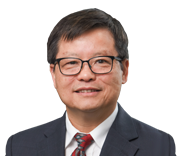In order to grow from a single cell to a complete organism, cells have to undergo many divisions. During each cell division there is a chance that DNA won’t be copied exactly, allowing small errors to creep in.
Fortunately, cells have evolved a mechanism, called “DNA mismatch repair,” to fix these types of mistakes. Eventually, though, errors from improper copying or exposure to environmental mutagens can lead to mutations that cause disease, like cancer.
A scientist at the University of Texas Southwestern Medical Center hopes to understand more about the complexities of DNA mismatch repair and eventually use this knowledge to tackle cancer.
Molecular biochemist Guo-Min Li was recruited from the University of Southern California Keck School of Medicine in 2017 with the help of an Established Investigator Award from CPRIT.
DNA mismatch repair is a system of proteins operating together that allows cells to fix small errors that crop up when they copy their DNA prior to dividing. Li is trying to figure out how the individual parts of the system work, i.e. which pieces are essential on their own and which ones have built-in redundancy.
Read More
In order to grow from a single cell to a complete organism, cells have to undergo many divisions. During each cell division there is a chance that DNA won’t be copied exactly, allowing small errors to creep in.
Fortunately, cells have evolved a mechanism, called “DNA mismatch repair,” to fix these types of mistakes. Eventually, though, errors from improper copying or exposure to environmental mutagens can lead to mutations that cause disease, like cancer.
A scientist at the University of Texas Southwestern Medical Center hopes to understand more about the complexities of DNA mismatch repair and eventually use this knowledge to tackle cancer.
Molecular biochemist Guo-Min Li was recruited from the University of Southern California Keck School of Medicine in 2017 with the help of an Established Investigator Award from CPRIT.
DNA mismatch repair is a system of proteins operating together that allows cells to fix small errors that crop up when they copy their DNA prior to dividing. Li is trying to figure out how the individual parts of the system work, i.e. which pieces are essential on their own and which ones have built-in redundancy.
His early research linked defects in mismatch repair to hereditary forms of colorectal cancer. Inherited mutations in the genes code for abnormal proteins in the mismatch repair system, nearly inevitably leading to cancer as other cellular mutations accrue.
Researchers have puzzled over other types of cancers that exhibit DNA-copying errors similar to those found in mismatch-repair–deficient cancers, but in which there is nothing wrong with the genes or components of the repair machinery.
Li recently found that these cancers are caused by a defect not in the repair system itself, but in a cell’s ability to call it to action. There is nothing wrong with the genes or the protein components of the mismatch repair system, but it’s analogous to having an inept general who is incapable of commanding his battle-ready foot soldiers. The cells accumulate defects that aren’t repaired, eventually causing cancer to develop.
Li is also interested in finding new ways of treating cancer. One of the proteins he’s developed to study mismatch repair initiates the repair and then is unable to complete it, or even to disengage. Since cancer cells undergo error-prone cell divisions and divide much more frequently than ordinary cells, eventually so many additional unrepaired mutations pile up that the cell dies. This protein would lead to the selective deaths of cancer cells.
“This work is high-risk, high-gain,” says Li, who is seeking additional funding to pursue this idea. “But if it gets funded, we should be able to immediately start working.”
In additional research, Li and his team are learning how DNA mismatch repair contributes to the success of immune therapy in treating cancer.
Li received his undergraduate and master’s degrees in biology from Wuhan University in China, and his Ph.D. in chemistry from Wayne State University. After a postdoctoral fellowship at Duke University, Li began his career at the University of Kentucky in 1995, where he spent 20 years as a professor of pathology and then toxicology & cancer biology. He left Kentucky for USC in 2015, becoming professor of biochemistry & molecular biology.
Read Less

